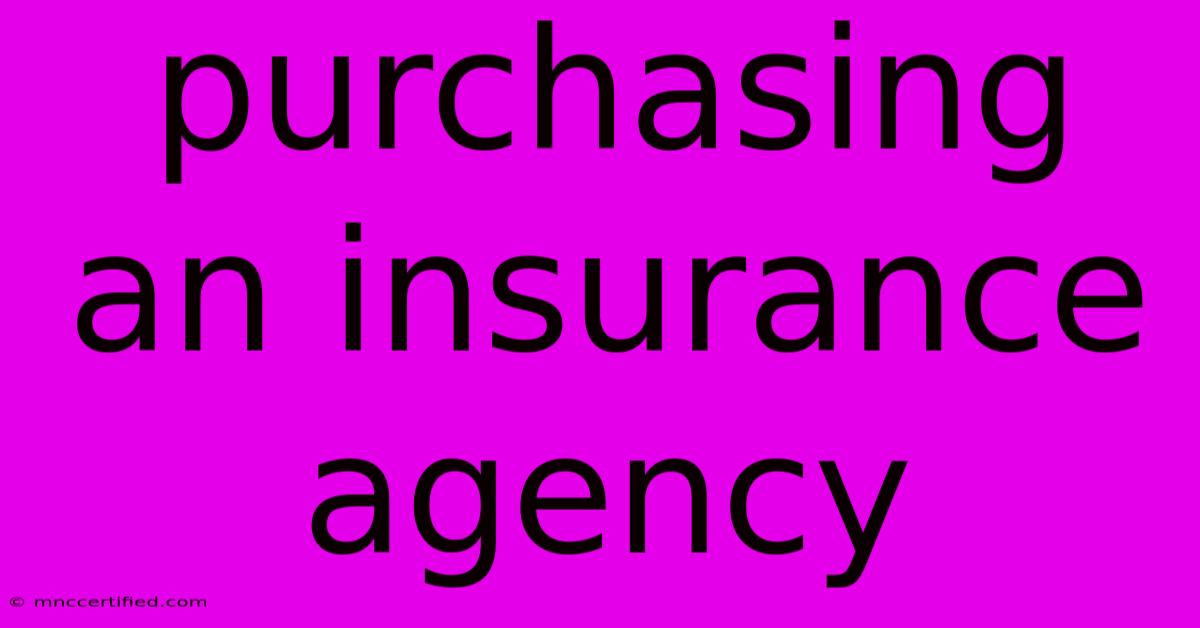Purchasing An Insurance Agency

Table of Contents
Purchasing an Insurance Agency: A Comprehensive Guide for Potential Buyers
Buying an insurance agency can be a lucrative investment, offering a stable income stream and the potential for significant growth. However, it’s a complex process requiring careful planning and due diligence. This comprehensive guide will walk you through the key steps involved in purchasing an insurance agency, helping you navigate the intricacies and make informed decisions.
Understanding the Insurance Agency Landscape
Before diving into the acquisition process, it's crucial to understand the current market. This involves researching different types of insurance agencies, including:
- Independent Agencies: These agencies represent multiple insurance carriers, offering clients a wider selection of policies and coverage options. They often enjoy greater flexibility and higher earning potential.
- Exclusive Agencies (Captive Agencies): These agencies represent only one insurance carrier, limiting their product offerings but often providing greater support and brand recognition.
Consider the size and location of the agency. A larger agency in a densely populated area might command a higher price but also offer greater revenue potential. Conversely, a smaller agency in a less competitive market may be easier to acquire and manage. Analyzing the agency's financial performance, including revenue, expenses, and profitability, is paramount. Look closely at the client base, assessing its retention rate and the potential for future growth. Finally, understanding the agency's technology infrastructure and its compliance with regulatory requirements is vital.
Steps to Purchasing an Insurance Agency
The process of buying an insurance agency can be broken down into several key steps:
1. Identifying Potential Acquisition Targets
Start by identifying potential agencies for acquisition. This can involve using online resources, networking within the industry, and engaging the services of a business broker specializing in insurance agency sales. A broker can provide valuable insights and expertise throughout the entire process.
2. Conducting Due Diligence
Thorough due diligence is critical. This includes:
- Financial Audits: Examine the agency's financial records, including income statements, balance sheets, and cash flow statements, for at least the past three to five years. Verify the accuracy of reported figures.
- Client Reviews: Analyze the agency's client base, paying close attention to client retention rates and potential risks.
- Legal Compliance: Ensure the agency is compliant with all relevant state and federal regulations. Look for any potential legal liabilities or pending lawsuits.
- Technology Assessment: Evaluate the agency's technology infrastructure, including its management system (e.g., AMS), and identify potential upgrades or replacements needed.
- Employee Evaluation: Assess the skills and experience of the agency's employees. Retaining key personnel is often crucial for a successful transition.
3. Negotiating the Purchase Agreement
Once due diligence is complete, negotiate the purchase agreement. Key aspects to negotiate include:
- Purchase Price: Determine a fair market value for the agency based on its financial performance and future potential. Common valuation methods include discounted cash flow analysis and market multiples.
- Payment Terms: Negotiate payment terms that suit your financial capabilities. This could involve a combination of cash, financing, and seller financing.
- Earn-Out Provisions: An earn-out allows the seller to receive additional payments based on the agency's performance after the acquisition. This can align incentives and ensure a smoother transition.
- Non-Compete Agreements: A non-compete agreement prevents the seller from starting a competing agency within a specific geographic area for a certain period.
4. Securing Financing
Securing financing is essential. Explore options such as:
- Bank Loans: Traditional bank loans are a common financing option.
- Seller Financing: The seller may agree to provide financing as part of the deal.
- Private Equity: Private equity firms may invest in insurance agencies.
5. Completing the Transaction
After securing financing and finalizing the purchase agreement, complete the transaction by transferring ownership and managing the transition.
Post-Acquisition Integration and Growth
After acquiring the agency, focus on successful integration and future growth:
- Client Retention: Prioritize maintaining strong relationships with existing clients.
- Employee Management: Retain and motivate key employees.
- Technology Upgrades: Invest in modern technology to streamline operations.
- Expansion Strategies: Explore opportunities for growth, such as expanding into new markets or offering additional insurance products.
Purchasing an insurance agency is a significant undertaking, requiring substantial financial resources, careful planning, and a deep understanding of the industry. By following these steps and conducting thorough due diligence, you can increase your chances of a successful acquisition and build a thriving business. Remember to consult with experienced professionals, including insurance brokers, legal counsel, and financial advisors, throughout the entire process.

Thank you for visiting our website wich cover about Purchasing An Insurance Agency. We hope the information provided has been useful to you. Feel free to contact us if you have any questions or need further assistance. See you next time and dont miss to bookmark.
Featured Posts
-
Breast Cancer Travel Insurance
Nov 27, 2024
-
Security First Insurance Flint
Nov 27, 2024
-
Richard Coles Grief I M A Celebrity
Nov 27, 2024
-
Arteta Double Arsenal Injury Boost
Nov 27, 2024
-
Sheffield Vs Oxford Live Championship Match Score
Nov 27, 2024